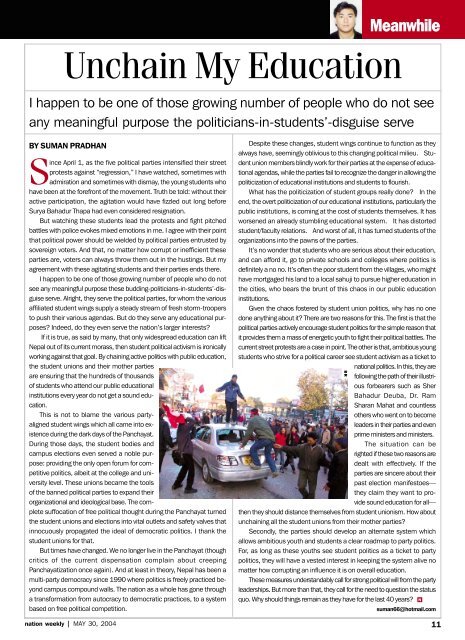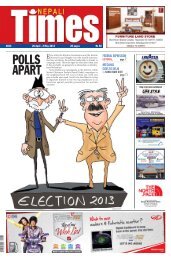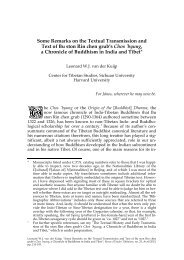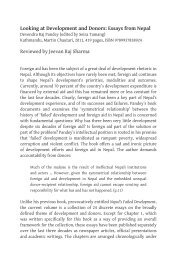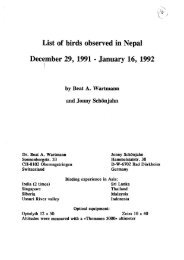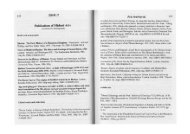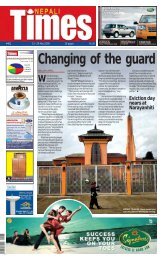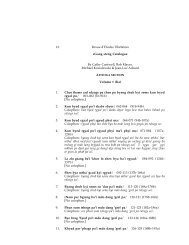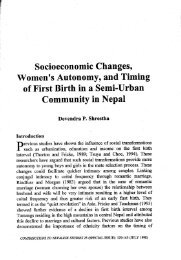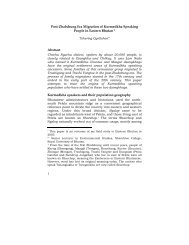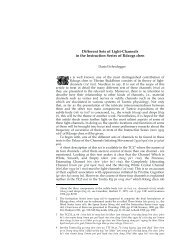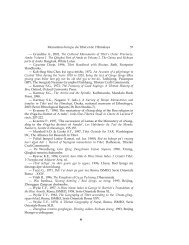You also want an ePaper? Increase the reach of your titles
YUMPU automatically turns print PDFs into web optimized ePapers that Google loves.
Unchain My Education<br />
Since April 1, as the five political parties intensified their street<br />
protests against “regression,” I have watched, sometimes with<br />
admiration and sometimes with dismay, the young students who<br />
have been at the forefront of the movement. Truth be told: without their<br />
active participation, the agitation would have fizzled out long before<br />
Surya Bahadur Thapa had even considered resignation.<br />
But watching these students lead the protests and fight pitched<br />
battles with police evokes mixed emotions in me. I agree with their point<br />
that political power should be wielded by political parties entrusted by<br />
sovereign voters. And that, no matter how corrupt or inefficient these<br />
parties are, voters can always throw them out in the hustings. But my<br />
agreement with these agitating students and their parties ends there.<br />
I happen to be one of those growing number of people who do not<br />
see any meaningful purpose these budding-politicians-in-students’-disguise<br />
serve. Alright, they serve the political parties, for whom the various<br />
affiliated student wings supply a steady stream of fresh storm-troopers<br />
to push their various agendas. But do they serve any educational purposes?<br />
Indeed, do they even serve the nation’s larger interests?<br />
If it is true, as said by many, that only widespread education can lift<br />
Nepal out of its current morass, then student political activism is ironically<br />
working against that goal. By chaining active politics with public education,<br />
the student unions and their mother parties<br />
are ensuring that the hundreds of thousands<br />
of students who attend our public educational<br />
institutions every year do not get a sound education.<br />
This is not to blame the various partyaligned<br />
student wings which all came into existence<br />
during the dark days of the Panchayat.<br />
During those days, the student bodies and<br />
campus elections even served a noble purpose:<br />
providing the only open forum for competitive<br />
politics, albeit at the college and university<br />
level. These unions became the tools<br />
of the banned political parties to expand their<br />
organizational and ideological base. The complete<br />
suffocation of free political thought during the Panchayat turned<br />
the student unions and elections into vital outlets and safety valves that<br />
innocuously propagated the ideal of democratic politics. I thank the<br />
student unions for that.<br />
But times have changed. We no longer live in the Panchayat (though<br />
critics of the current dispensation complain about creeping<br />
Panchayatization once again). And at least in theory, Nepal has been a<br />
multi-party democracy since 1990 where politics is freely practiced beyond<br />
campus compound walls. The nation as a whole has gone through<br />
a transformation from autocracy to democratic practices, to a system<br />
based on free political competition.<br />
nation weekly | MAY 30, 2004<br />
Meanwhile<br />
I happen to be one of those growing number of people who do not see<br />
any meaningful purpose the politicians-in-students’-disguise serve<br />
BY SUMAN PRADHAN<br />
Despite these changes, student wings continue to function as they<br />
always have, seemingly oblivious to this changing political milieu. Student<br />
union members blindly work for their parties at the expense of educational<br />
agendas, while the parties fail to recognize the danger in allowing the<br />
politicization of educational institutions and students to flourish.<br />
What has the politicization of student groups really done? In the<br />
end, the overt politicization of our educational institutions, particularly the<br />
public institutions, is coming at the cost of students themselves. It has<br />
worsened an already stumbling educational system. It has distorted<br />
student/faculty relations. And worst of all, it has turned students of the<br />
organizations into the pawns of the parties.<br />
It’s no wonder that students who are serious about their education,<br />
and can afford it, go to private schools and colleges where politics is<br />
definitely a no no. It’s often the poor student from the villages, who might<br />
have mortgaged his land to a local sahuji to pursue higher education in<br />
the cities, who bears the brunt of this chaos in our public education<br />
institutions.<br />
Given the chaos fostered by student union politics, why has no one<br />
done anything about it? There are two reasons for this. The first is that the<br />
political parties actively encourage student politics for the simple reason that<br />
it provides them a mass of energetic youth to fight their political battles. The<br />
current street protests are a case in point. The other is that, ambitious young<br />
students who strive for a political career see student activism as a ticket to<br />
national politics. In this, they are<br />
following the path of their illustrious<br />
forbearers such as Sher<br />
Bahadur Deuba, Dr. Ram<br />
Sharan Mahat and countless<br />
others who went on to become<br />
leaders in their parties and even<br />
prime ministers and ministers.<br />
The situation can be<br />
righted if these two reasons are<br />
dealt with effectively. If the<br />
parties are sincere about their<br />
past election manifestoes—<br />
they claim they want to provide<br />
sound education for all—<br />
then they should distance themselves from student unionism. How about<br />
unchaining all the student unions from their mother parties?<br />
Secondly, the parties should develop an alternate system which<br />
allows ambitious youth and students a clear roadmap to party politics.<br />
For, as long as these youths see student politics as a ticket to party<br />
politics, they will have a vested interest in keeping the system alive no<br />
matter how corrupting an influence it is on overall education.<br />
These measures understandably call for strong political will from the party<br />
leaderships. But more than that, they call for the need to question the status<br />
quo. Why should things remain as they have for the last 40 years?<br />
suman66@hotmail.com<br />
BR<br />
11


